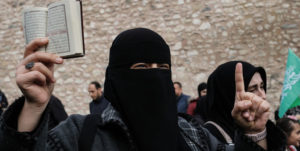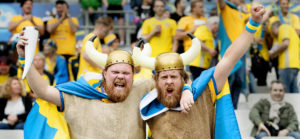Sweden has long been a country known for its commitment to tolerance and its embrace of human rights: a “moral superpower” devoted to foreign aid, progressive causes and support of developing nations. All the more surprising, then, that Sweden now stands accused of being a hotbed of Islamophobia and intolerance. Repeated burnings of the Quran, most recently at the weekend, have provoked a strong response in the Muslim world and beyond. That the Organization of Islamic Cooperation has protested may seem predictable, but even the EU and the Pope have made similar declarations. “Not everything that is legal is ethical,” said Josep Borrell.
The burnings had already become a geopolitical conflagration thanks to Sweden’s Nato accession, which effectively led to Sweden’s bid becoming hostage to the whims of Turkey’s President Erdogan. However, beneath the surface of immediate security politics looms a question of the status of religion and the position of minority religious communities in Swedish political culture. The Government’s rhetorical embrace of human rights, including respect of religion, runs in conflict with Sweden’s institutional arrangement that is hostile not only to religion, but also to communitarian claims at large.
As Henrik Berggren and I have argued in our recent book, Sweden is not only one of the most secular countries in the world — its social contract is based on a radical alliance between the state and the individual. The central purpose is precisely to liberate individuals from families, religious communities, charities and other institutions of civil society that limit individual freedom in the name of communal identity. And this moral logic results in a civic universalism that is fundamentally hostile to communitarian claims, including, perhaps especially, those that are made in the name of religion.
In this regard, Sweden sticks out in studies such as the World Values Survey. Not only is the contrast to the Islamic world particularly dramatic, Sweden also stands out compared to Western countries such as the US and Germany, whose social contracts afford a far greater role to religious and ethnic communities. In Sweden, religious freedom is conceived as a right to practise religion as a private matter. Thus, the Swedish idea of religious freedom is as much, maybe more, a question of freedom from religion as it is a right to religion.
Faith in God or gods takes place inside the home, inside the individual mind, and only collectively in congregations conceived of as private, voluntary associations. Insofar as a church acts publicly, it is expected that they adhere to the values, laws, and mores of secular society. This “civil religion”, focused on individual citizenship, gender equality, and children’s rights, always trumps what is seen as outdated and conservative claims rooted in premodern notions of religious faith and moral codes expressed in various religious texts. The “holy” texts of religion should accordingly have no bearing on the primacy of the constitution and laws of the modern, secular state.
It is in this light one must understand the growing conflict between Sweden and Muslim and Islamist activists, religious leaders and political regimes. And while the burnings of the Quran are important, there is further pre-history to the recent uproar that provides a better context for understanding the heart of the current conflict. Here I refer to the recent social-media campaign in which Muslim activists claimed that Swedish social services were kidnapping the children of Muslim parents. The background is that Sweden has experienced massive immigration in recent decades, including many refugees from Muslim countries such as Somalia, Afghanistan, Iraq and Syria. This has resulted in cultural collisions in general, but notably over their very different understandings of the role of the family, of parental rights versus children’s rights, and the place of religion and religious faith in a secular society.
While the social-media campaign is most often described as a matter of disinformation and misunderstanding, one must also recognise that what is viewed from a Swedish perspective as legitimate and necessary can, from a conservative Muslim point of view, appear hostile to family values and parental rights. It is also true that children are removed from their families in accordance with laws aimed at protecting and supporting children. This pertains to all families in Sweden, including ethnic Swedes, but foreign-born children are over-represented statistically. While around 10% of ethnic Swedish children determined to need support are removed, the figure for foreign-born families is just over 20%.
In a Swedish context, the state has not only a right but a duty to intervene when it is determined that parents fail to give their children proper care. But this is radically different from what pertains in the Muslim world, where a more conservative parent is likely to see interventions by social workers as an infringement of their right to bring up their children as they see fit: in accordance with religious belief, their views on parental authority and gender roles.
Another illustrative example concerns the demands sometimes made by Muslims, as well as conservative Christians and Jews, in favour of a right to religious private schools and, especially, home-schooling on religious grounds. These demands are routinely rejected by the Swedish state, which maintains that decisions regarding religion should be made once you are an adult. Through these measures, the reach of religious freedom is actively limited. Religion is transformed into something that is a private matter, appropriate perhaps for adults, but certainly not a consideration in an education that is aimed to produce autonomous, modern children.
But this value conflict has a philosophical element: a naïve and abstract sense of tolerance as a positive value, one that is poorly equipped to deal with enduring and concrete forms of cultural difference. My sense is that there has been an implicit expectation that, over time, immigrants arriving in Sweden from less modern, democratic, and developed nations would eventually embrace secular, democratic, liberal values. And there has been, empirically speaking, some basis for this expectation. Many of the refugees arriving in Sweden in decades past, from Chile and Iran, for example, behaved in much this way. Women escaping the Islamist regime in Iran saw opportunity for more freedom in Sweden; refugees from Chile found more political freedom in Sweden than under the repressive government of Pinochet.
Many of these earlier immigrants were well-educated and therefore also well-placed to integrate into Swedish society through employment. However, more recent arrivals, such as those from Afghanistan and Somalia, have tended to be less educated, as well as more conservative and traditional at a religious and cultural level. These contradictions have been hidden by Sweden’s long-standing love affair with being seen as a moral superpower — indeed, today there is more concern over the negative impact on Sweden’s reputation following the Quran burnings than a genuine concern for Muslim religious feeling.
But what we may be seeing now is the unmasking of this idea of boundless tolerance. We have already witnessed a profound shift in Sweden’s foreign relations: from the vague idealism of autonomous neutrality towards the hardcore realpolitik of Nato membership. Likewise, abandoning our current longstanding but incoherent cultural relativism will open up for a more honest position. Of course, it will be a painful process, accompanied by considerable confusion and conflict. But it may over time lead to greater clarity over what Sweden actually stands — and is willing to fight — for.
For while we live in an era of the “politics of recognition”, which promotes respect for difference in the form of multiculturalism, it is useful to remind ourselves what the Canadian philosopher Charles Taylor, who fathered the term, noted in his essay of the same name in 1992. Namely, that while liberalism may involve tolerance as a core value, it is also a “fighting creed” that can and will at times collide with competing ideologies. When push comes to shove, tolerance is of little help in facing challenges from illiberal political and religious ideologies.
In his seminal book, The Open Society and its Enemies (1945), Karl Popper put his finger on the same dilemma, which he termed the paradox of tolerance: “Unlimited tolerance must lead to the disappearance of tolerance. If we extend unlimited tolerance even to those who are intolerant, if we are not prepared to defend a tolerant society against the onslaught of the intolerant, then the tolerant will be destroyed, and tolerance with them.” Precisely where the lines must be drawn will no doubt be subject to ongoing debate — but for Sweden, one suspects that the primacy of freedom of expression will trump demands for the special treatment of religious sensitivity in the public sphere.
Disclaimer
Some of the posts we share are controversial and we do not necessarily agree with them in the whole extend. Sometimes we agree with the content or part of it but we do not agree with the narration or language. Nevertheless we find them somehow interesting, valuable and/or informative or we share them, because we strongly believe in freedom of speech, free press and journalism. We strongly encourage you to have a critical approach to all the content, do your own research and analysis to build your own opinion.
We would be glad to have your feedback.
Source: UnHerd Read the original article here: https://unherd.com/



